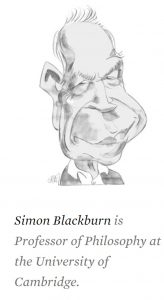Simon Blackburn in Inference Review:
 If anxiety about truth is very much in the air, it has been in the air for a very long time. Well before the advent of tweets and trolls, George Orwell expressed the fear that “the very concept of objective truth [was] fading out of the world.”1 Orwell’s anxieties were political. Truth was under attack by politicians and their propagandists. Our anxieties are cultural, the widespread sense that a number of philosophical theories have escaped the academic world, and, in the wild, are doing great harm. Writing in the otherwise staid European Molecular Biology Organization Report, Marcel Kuntz affirmed that “postmodernist thought is being used to attack the scientific worldview and undermine scientific truths; a disturbing trend that has gone unnoticed by a majority of scientists.”2
If anxiety about truth is very much in the air, it has been in the air for a very long time. Well before the advent of tweets and trolls, George Orwell expressed the fear that “the very concept of objective truth [was] fading out of the world.”1 Orwell’s anxieties were political. Truth was under attack by politicians and their propagandists. Our anxieties are cultural, the widespread sense that a number of philosophical theories have escaped the academic world, and, in the wild, are doing great harm. Writing in the otherwise staid European Molecular Biology Organization Report, Marcel Kuntz affirmed that “postmodernist thought is being used to attack the scientific worldview and undermine scientific truths; a disturbing trend that has gone unnoticed by a majority of scientists.”2
This view of postmodernism as an intellectual villain is very common.
Whatever postmodernism is in the arts, I am concerned with its philosophy of language, its view of truth. Familiar figures have, by now, become infamous: Jean Baudrillard, Jacques Derrida, Michel Foucault, Martin Heidegger, Frederic Jameson, Douglas Kellner, Jean-François Lyotard, and Richard Rorty. Philosophical postmodernists emphasized the possibility of different perspectives on things, or different interpretations of them. They denied the existence of unmediated or innocent observation, and were dubious about the distinction between facts and values, the analytic and the synthetic, the mind and the world. Skeptical about truth, and sensitive to shifts in culture, society, and history, they thought of words as tools, and believed that vocabularies survive because they enable us to cope, to meet our goals.
They mistrusted authority.
More here.
